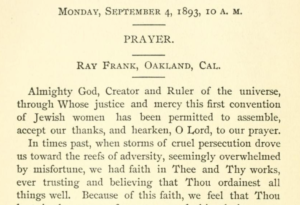Contributor(s): Shared on: 4 December 2021 under the Creative Commons Zero (CC 0) Universal license a Public Domain dedication Categories: Tags: | Contribute a translation | Source (English) |
|---|
|
Almighty God, Creator and Ruler of the universe,
through Whose justice and mercy
this first convention of Jewish women
has been permitted to assemble,
accept our thanks,
and hearken, O Lord, to our prayer. | |
In times past,
when storms of cruel persecution
drove us toward the reefs of adversity,
seemingly overwhelmed by misfortune,
we had faith in Thee and Thy works,
ever trusting and believing
that Thou ordainest all things well.
Because of this faith,
we feel that Thou hast,
in the course of events,
caused this glorious congress to convene,
that it may give expression to that which shall
spread broadcast a knowledge of Thee and Thy deeds. | |
Grant, then, Thy blessing upon those assembled,
and upon the object of their meeting.
May the peculiar circumstances,
which have brought together, under one roof,
both Catholic and Jew,
who, for centuries, have been seeking to serve Thee,
though in different ways,
be a promise of future peace.
Grant, we beseech Thee,
that this convention may be productive of that
which is in accordance with Thy will. | |
Bless, O Lord,
this our country and the President thereof,
and all the people of the land.
May love and peace be the heritage of men,
to remain with them forever.
Amen. |
This opening prayer by Ray Frank was first published in the Papers of the Jewish Women’s Congress: held at Chicago, September 4-7, 1893 (1894), p. 8. The unprecedented Jewish Women’s Congress was held as part of the World Parliament of Religion at the World’s Columbian Exposition. Source(s)
Founded in 1893, the National Council of Jewish Women (NCJW) is a grassroots organization of volunteers and advocates who turn progressive ideals into action. Inspired by Jewish values, NCJW strives for social justice by improving the quality of life for women, children, and families and by safeguarding individual rights and freedoms.  Rachel (Ray) Frank (April 10, 1861 in San Francisco – October 10, 1948) was a Jewish religious leader and educator in the United States. Frank was the daughter of Polish immigrants who emigrated to the far west of the United States. She described her parents, Bernard and Leah Frank, as "liberal-minded orthodox Jews." Her father, a descendant of the Vilna Gaon, was a traveling merchant whose livelihood involved commerce and trade with Native/indigenous peoples. As a young woman, Rachel Frank taught Bible studies and Jewish history at the First Hebrew Congregation of Oakland's Sabbath school, where she began to hone her skills as a public speaker and make a name for herself within the California Jewish community. Her students included Gertrude Stein, later to become a famous writer, and Judah Leon Magnes, who would become a prominent Reform rabbi. At the same time, Frank worked as a correspondent for several San Francisco and Oakland newspapers and was a frequent contributor to a number of national Jewish publications. In the fall of 1890, Frank was visiting Spokane, Washington when she was invited to deliver a sermon on the eve of Yom Kippur (Jewish day of Atonement). The impassioned sermon she delivered after the service made a deep impression on the audience made up of townspeople- Christians as well as Jews. As the first Jewish woman to preach formally from a pulpit in the United States, inaugurating a career as "the Girl Rabbi of the Golden West" that would help to blaze new paths for women in Judaism. Despite the fact that Frank claimed to have no interest in becoming a rabbi, her actions forced American Jewry to consider the possibility of the ordination of women seriously for the first time. As a result, Frank spent much of the 1890s traveling up and down the West coast giving lectures to B'nai B'rith lodges, literary societies, and synagogue women's groups, speaking in both Reform and Orthodox synagogues, giving sermons, officiating at services, and even reading Scripture. Although headlines began to refer to Frank, incorrectly, as the first woman rabbi, and she was reportedly offered several pulpits, Frank insisted that she had never had any desire for ordination. Aharon Varady (M.A.J.Ed./JTSA Davidson) is a volunteer transcriber for the Open Siddur Project. If you find any mistakes in his transcriptions, please let him know. Shgiyot mi yavin; Ministarot naqeni שְׁגִיאוֹת מִי־יָבִין; מִנִּסְתָּרוֹת נַקֵּנִי "Who can know all one's flaws? From hidden errors, correct me" (Psalms 19:13). If you'd like to directly support his work, please consider donating via his Patreon account. (Varady also translates prayers and contributes his own original work besides serving as the primary shammes of the Open Siddur Project and its website, opensiddur.org.) Read a comment / Leave a comment (moderated) Works of related interest: |






![Secretary of State Michael R. Pompeo delivers remarks in the Senate Chamber of the Wisconsin State Capitol, in Madison, Wisconsin, on September 23, 2020. [State Department Photo by Ron Przysucha/ Public Domain]](https://opensiddur.org/wp-content/uploads/2024/06/Secretary_Pompeo_Delivers_Remarks_in_the_Senate_Chamber_of_the_Wisconsin_State_Capitol_50378281008-250x250.jpg)





Leave a Reply